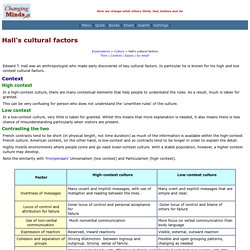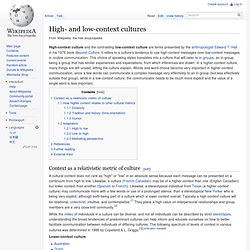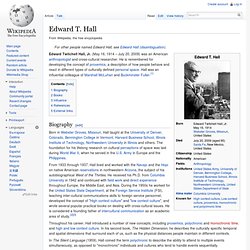

Hall's cultural factors. Explanations > Culture > Hall's cultural factors Time | Context | Space | So what?

Edward T. Hall was an anthropologist who made early discoveries of key cultural factors. In particular he is known for his high and low context cultural factors. Context High context In a high-context culture, there are many contextual elements that help people to understand the rules. This can be very confusing for person who does not understand the 'unwritten rules' of the culture. Low context In a low-context culture, very little is taken for granted. Contrasting the two. Edward T. Hall. High context culture. High-context culture and the contrasting low-context culture are terms presented by the anthropologist Edward T.

Hall in his 1976 book Beyond Culture. It refers to a culture's tendency to use high-context messages over low-context messages in routine communication. This choice of speaking styles translates into a culture that will cater to in-groups, an in-group being a group that has similar experiences and expectations, from which inferences are drawn. In a higher-context culture, many things are left unsaid, letting the culture explain. Words and word choice become very important in higher-context communication, since a few words can communicate a complex message very effectively to an in-group (but less effectively outside that group), while in a low-context culture, the communicator needs to be much more explicit and the value of a single word is less important.
Context as a relativistic metric of culture[edit] Lower-context culture Higher-context culture Diversity[edit] Humor[edit] Edward T. Hall. Edward Twitchell Hall, Jr.

(May 16, 1914 – July 20, 2009) was an American anthropologist and cross-cultural researcher. He is remembered for developing the concept of proxemics, a description of how people behave and react in different types of culturally defined personal space. Hall was an influential colleague of Marshall McLuhan and Buckminster Fuller.[1] Biography[edit] Born in Webster Groves, Missouri, Hall taught at the University of Denver, Colorado, Bennington College in Vermont, Harvard Business School, Illinois Institute of Technology, Northwestern University in Illinois and others. From 1933 through 1937, Hall lived and worked with the Navajo and the Hopi on native American reservations in northwestern Arizona, the subject of his autobiographical West of the Thirties. Throughout his career, Hall introduced a number of new concepts, including proxemics, polychronic and monochronic time, and high and low context culture. Books[edit] Influence[edit] References[edit] Do your best! Ganbatte! がんばって!
One word that fascinates me to no end is the word ganbatte (sometimes written gambatte).

It is a saying used to encourage people to try hard or used before a performance to say good luck. Ian Thomas Ash has an excellent write up on the various conjugations of the word ganbatte. It starts to get pretty complex, but think about all the ways you can encourage people to do their best! Don't forget to support our friends in Japan! 頑張って (がんばって)Ganbatte: Do your best The word ganbatte stems from the verb ganbaru: 頑張る (がんばる)Ganbaru: To do one's best Here are some other ways to use this handy verb: 頑張ります (がんばります)Ganbarimasu: I do my best 頑張れ (がんばれ)Ganbare: Do your best 頑張ってください (がんばってください)Ganbatte Kudasai: Do your best, please.
頑張った (がんばった)Ganbatta: I did my best 頑張りました (がんばりました)Ganbarimashita: I did my best (formal) 頑張れます (がんばれます)Ganbaremasu: I can do my best 頑張れる (がんばられる)Ganbareru: I am able to do my best 頑張っています (がんばっています)Ganbatteimasu: I am doing my best 頑張りたい (がんばりたい)Ganbaritai: I want to do my best.